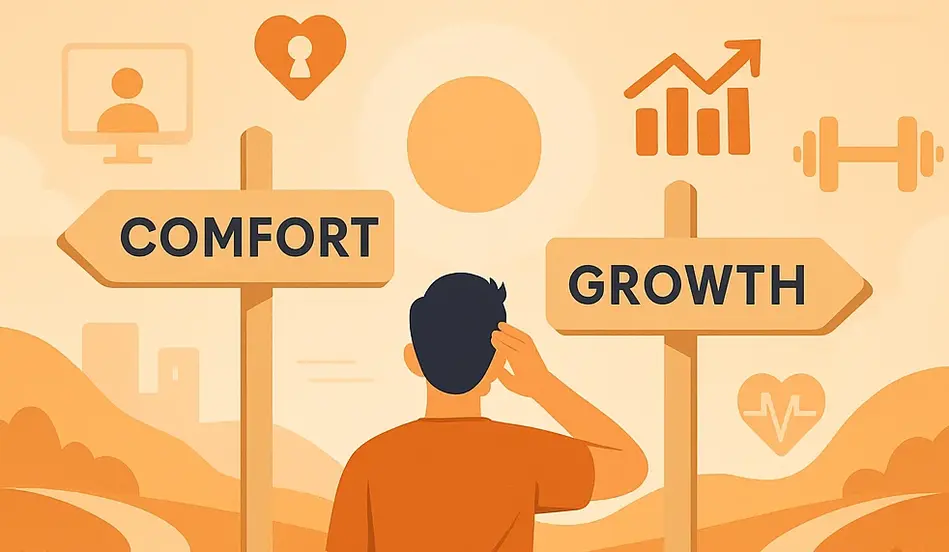Life advice for 30s – wake up to reality becomes crucial as you enter this transformative decade where the margin for error shrinks and the consequences of your choices compound. At 41, I’ve learned that your thirties are when life stops forgiving the mistakes you got away with in your twenties, and it’s time to take your health, relationships, and priorities seriously.
In your twenties, you could drink six Red Bulls a day, eat Reese’s cups for dinner, party until 4 AM, sleep on a sidewalk for two hours, and still function perfectly the next day. Those days are behind you. Your body will no longer forgive you for the abuse you subjected it to. The older you get, the more the world will punish you, the more your body will punish you, and the more your mental sanity will punish you for poor decisions.
This harsh reality check isn’t meant to discourage you but to prepare you for the most important decade of your life. Your thirties are when you build the foundation for the rest of your life, and the choices you make now will determine your future success, happiness, and fulfillment.
The Harsh Truth About Relationships and Marriage
One of the most dangerous misconceptions about relationships is that marriage and children will fix existing problems. They don’t. They make the same relationship problems harder to deal with because now you have more at stake, more complexity, and more people affected by your decisions.
I’ve watched countless friends struggle in relationships and, rather than having difficult conversations or going through the messy process of breaking up, they double down. They get engaged, have children, and hope that these major life changes will somehow resolve their underlying issues. It’s like watching someone drive a speeding car toward a brick wall in slow motion – you can wave your arms and shout warnings, but there’s nothing you can do to stop the inevitable collision.
The quality of your life in your thirties will shrink and expand in proportion to how difficult of a conversation you can have with the people in your life. When you were young, the stakes were low. You were broke, by yourself, and nothing really mattered. If you couldn’t address issues, there wasn’t much downside. But in your thirties, you’ve built up a life, relationships, a career, and hopefully some financial stability. That inability to address problems and have uncomfortable conversations will cost you dearly.
The Psychology of Maturity and Self-Definition
Until you stop needing everyone’s approval of your choices, you’re not an adult – you’re a 30-year-old child. True maturity, distilled into its simplest form, is the ability to do things that will cause you to be disliked. If you study developmental psychology, the defining aspect of adolescence is basing all opinions and choices on pleasing the people around you.
To reach true adulthood and self-knowledge, you must be willing to do things that may upset those around you. This doesn’t mean being selfish or inconsiderate, but rather making decisions based on your values and long-term well-being rather than others’ immediate approval.
Your social circle will shrink, and this is actually a good thing. As you get older, people have more responsibilities, more things they care about, and less time for casual relationships. This natural filtering process allows you to focus on the people who truly matter – those who support your growth, share your values, and add genuine value to your life.
The Evolution of Success and Dreams
Your definition of success will evolve and change, and you should let it. The uncomfortable truth is that we don’t really know what we want most of the time. We set goals and dreams, then realize that achieving them isn’t what we expected. The experience of having something often differs dramatically from what we fantasized about.
I learned this lesson the hard way when I went to music school. I dreamed of being a musician, performing on stage, going on tours, and experiencing the rock star lifestyle. The reality was sitting alone in a practice room with zero applause. I dropped out of music school because the dream didn’t match the reality.
This brings us to one of the most difficult truths about your thirties: you’re going to have to decide which of your dreams to let die. While motivational posters and Instagram accounts tell you to never give up on your dreams, reality teaches us that life is hard and accomplishing anything meaningful requires tremendous effort. At some point, an old dream becomes more of a prison than liberation, and when you reach that point, it’s time to let it go.
The Compound Effect of Your Choices
Life operates like an investment portfolio – your neglects compound the same way your efforts do. If you put in effort in your twenties, you’ll see compounding results in your thirties. But the things you ignore, the difficult questions you don’t ask, and the problems you don’t address will also compound.
This is particularly dangerous because if you repeat the same excuses long enough, they begin to calcify into your identity. It’s one thing to be young and irresponsible, avoiding unpleasant situations and making excuses. But if you keep repeating those excuses without holding yourself accountable, they become who you are in your thirties. They define how you see the world and interact with it.
The most expensive thing in your thirties isn’t money – it’s time. Once you reach this age, you start appreciating how precious every hour of every day is. Every minute needs to be invested in something valuable or meaningful. This isn’t about becoming an obsessive productivity workaholic, but about paying attention to what adds value to your life and being ruthless about editing out everything that doesn’t.
Health, Habits, and the Reality of Aging
If you haven’t gotten your health habits in order, this is the time to do it. The data on people with bad health habits after 40 is significantly worse than for people in their thirties. You’ve gotten away with poor choices up to this point, but it’s about to get much worse.
Eat vegetables, wear sunscreen, stop drinking on Tuesday nights, and stop dating people who don’t add value to your life. You can’t life hack your way out of poor priorities. You can watch a million YouTube videos, learn every life hack, and optimize every aspect of your routine, but if you’re wasting your life on the wrong things, none of it matters.
The key is focusing on the right things and caring about the right things. If you’re in a job you hate, dating a person you hate, or living in a place you hate, you’re just moving chairs around on the Titanic. You need to address the fundamental issues rather than trying to optimize around them.
Focus on What Truly Matters
Just like health habits, your career choices shape your future. If you’re stuck in a job that drains you, it’s time to stop optimizing around the problem and take bold action. Post your job on WhatJobs today and connect with people ready to add real value — or find a new role that aligns with your priorities.
Post a Job Free for 30 Days →The Foundation of Respect and Consistency
Respect is built by keeping promises, not impressing people. Your attempts to impress people actually make you less respectable. In reality, we look for consistency – someone who does what they say they’re going to do, shows up when they say they will, and is supportive when you expect them to be.
This applies to yourself as well. You can’t impress yourself into self-respect with fancy cars, big houses, or material possessions. The same way a midlife crisis car doesn’t inspire awe in others, it won’t inspire awe in yourself either. True self-respect comes from living according to your values and being consistent with your commitments.
Career vs. Relationships: What Really Matters
While your career is important, it matters less than the people you share your life with. You want to be surrounded by people you care about and enjoy being with. Don’t do work you hate, find something you’re good at, but remember that ultimately, relationships are what give life meaning.
The beauty of being in your thirties is that you’re old enough to know what not to do, what not to care about, and which people not to waste your time with, but you’re still young enough to have plenty of runway to compound good decisions and build an amazing life ahead.
The Appreciation of Time and Its Acceleration
The most profound realization of your thirties is that time never slows down. Every year gets faster than the year before, every year has more things you care about, and yet the amount of available time continues to get slimmer. This makes every waking hour feel more meaningful and important, but it also increases the stakes and narrows the margin for error.
While your body may not forgive you for poor choices these days, your mind definitely won’t either. The compound effect of your decisions becomes more apparent, and the consequences of neglect become more severe.
Frequently Asked Questions
Life advice for 30s – wake up to reality – what does this mean for my health?
Life advice for 30s – wake up to reality means your body will no longer forgive the poor health choices you got away with in your twenties. It’s time to prioritize proper nutrition, exercise, sleep, and stress management before the consequences become severe.
How do I know which relationships to invest in during my 30s?
Focus on relationships that add genuine value to your life and support your growth. Your social circle will naturally shrink as you prioritize quality over quantity, and this is actually beneficial for your overall well-being and life satisfaction.
What should I do about dreams that no longer serve me?
Life advice for 30s – wake up to reality includes recognizing when old dreams have become prisons rather than liberation. It’s okay to let go of dreams that no longer align with your values or circumstances, even if it feels difficult.
How can I build true self-respect in my 30s?
True self-respect comes from living according to your values and being consistent with your commitments, not from material possessions or external validation. Focus on keeping promises to yourself and others rather than trying to impress people.
A Real-World Example: Jennifer’s Wake-Up Call
Jennifer Martinez, a 32-year-old marketing manager from Austin, exemplifies how life advice for 30s – wake up to reality can transform your life. After years of burning the candle at both ends, eating poorly, and staying in a toxic relationship, Jennifer hit a breaking point when she was diagnosed with high blood pressure and anxiety.
“I was living like I was still 22,” Jennifer explains. “I was drinking energy drinks all day, eating fast food, staying up late, and dating someone who constantly put me down. I thought I could keep going like this forever, but my body and mind finally said ‘enough.'”
Jennifer’s wake-up call came when her doctor told her that her lifestyle was putting her at risk for serious health problems. “I realized I was 32, not 22, and I needed to start taking my health seriously. I also realized that staying in a relationship that made me feel bad about myself was just wasting precious time.”
Jennifer made dramatic changes to her lifestyle, including adopting a healthier diet, establishing a regular sleep schedule, starting a consistent exercise routine, and ending her toxic relationship. She also began having difficult conversations with friends and family members about boundaries and expectations.
“At first, it was scary to disappoint people by saying no to things that didn’t serve me,” Jennifer says. “But I learned that true maturity means being willing to do things that might upset others if it’s what’s best for your long-term well-being.”
Within a year, Jennifer had lost 30 pounds, significantly reduced her stress levels, and found a new relationship with someone who supported her goals and values. She also advanced in her career because she had more energy and focus to devote to her work.
“Life advice for 30s – wake up to reality isn’t about being pessimistic,” Jennifer reflects. “It’s about being realistic about what your body, mind, and relationships need to thrive. I wish I had made these changes earlier, but I’m grateful I didn’t wait until my 40s to start taking my life seriously.”
Jennifer’s story demonstrates that while the wake-up call can be uncomfortable, it’s also the beginning of a more authentic, healthy, and fulfilling life. The key is recognizing the signs early and having the courage to make necessary changes before the consequences become more severe.






